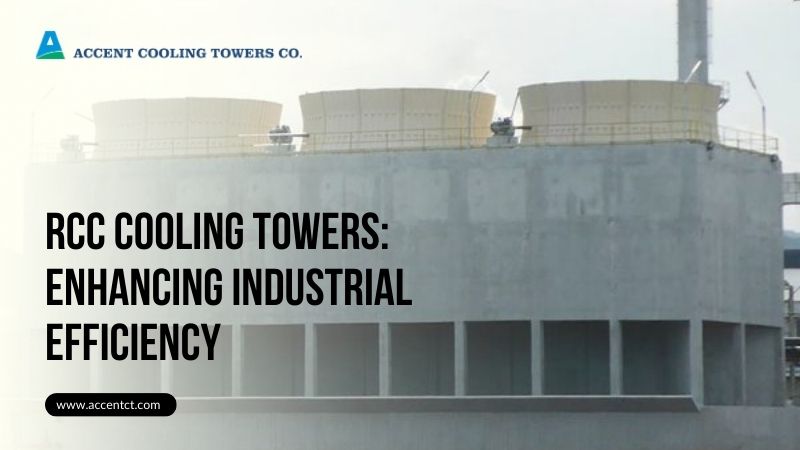Table of Contents
The importance of cooling towers worldwide, especially Reinforced Cement Concrete (RCC) cooling towers, can’t be overstated for industries requiring cooling solutions. We at Accent Cooling Tower Co. recognize the importance of these structures in maintaining efficiency across various industries. This article explores the advantages and uses of RCC cooling towers and highlights their role in the industrial process.
The Basics of RCC Cooling Towers
RCC cooling towers, known for their robust construction and durability, are pivotal in various industrial processes. Reinforced Cement Concrete (RCC) cooling towers are designed to withstand harsh environmental conditions and offer long-term reliability. These towers are favored for their structural strength, making them ideal for heavy-duty applications.
In an RCC cooling tower, the cooling process is facilitated through the principle of heat exchange, where water and air interact. The design of these towers allows for efficient cooling even in continuous operation scenarios, making them suitable for industries with high cooling demands.
One of the significant advantages of RCC cooling towers is their resistance to corrosion and weathering, unlike their metal counterparts. This feature extends their lifespan and reduces maintenance requirements. Moreover, RCC towers can be custom-built to specific dimensions and capacities, catering to the unique needs of different industrial sectors.
RCC cooling towers are an excellent choice for businesses seeking a long-term cooling solution due to their structural integrity and operational efficiency. When selecting an RCC cooling tower, it’s essential to consider factors like size, capacity, and environmental conditions to ensure optimal performance and longevity.
Energy Efficiency and Efficacious Operation in RCC Cooling Towers
RCC cooling towers are renowned for their energy efficiency and effective operation, making them an ideal choice for various industrial applications. The design of these towers, utilizing reinforced cement concrete, ensures durability and resilience, leading to less energy consumption over time. The structural strength of RCC cooling towers allows for optimal thermal performance, which translates to significant energy savings.
Incorporating advanced design features, RCC cooling towers facilitate improved heat transfer efficiency. This efficiency is crucial in reducing operational costs and energy usage, making them an environmentally friendly option. Their ability to operate effectively under different environmental conditions further enhances their appeal.
The combination of energy efficiency and efficacious operation in RCC cooling towers makes them a sustainable choice for industries looking to optimize their cooling processes while minimizing environmental impact. Using RCC material ensures long-term operational benefits, reinforcing their status as an intelligent investment for energy-conscious businesses.
Applications across Industries for RCC Cooling Towers
RCC cooling towers are versatile and crucial in a wide range of industries due to their durability and efficient cooling capabilities. In sectors like power generation, petrochemicals, and metallurgy, these towers provide essential cooling to maintain operational temperatures. Their robust construction makes them suitable for environments with high thermal loads and aggressive industrial conditions. In the HVAC industry, RCC cooling towers contribute to efficient temperature regulation in large buildings. The food and processing industries also benefit from their consistent performance, which is vital for maintaining quality standards. The adaptability and resilience of RCC cooling towers across diverse industrial applications underscore their importance in modern industrial operations.
Cooling Tower Water Management and Treatment in RCC Cooling Towers
Effective water management and treatment are vital for the efficient operation of RCC cooling towers. These towers require a well-maintained water system to ensure optimal heat transfer and prevent issues like scaling, corrosion, and biological growth. Implementing a comprehensive water treatment program can significantly enhance the performance and lifespan of RCC cooling towers. This involves regular monitoring of water quality, using appropriate chemical treatments, and adopting water conservation strategies. Such practices not only maintain the efficiency of RCC cooling towers but also contribute to sustainable water usage in industrial processes.
Sustainable and Long-lasting Solutions with RCC Cooling Towers
RCC cooling towers are synonymous with sustainability and longevity in industrial cooling systems. Their robust construction from reinforced cement concrete ensures a longer lifespan, reducing the need for frequent replacements. This durability makes RCC cooling towers a cost-effective solution over time. Additionally, their design minimizes water and energy consumption, contributing to more sustainable industrial practices. For industries looking to balance operational efficiency with environmental responsibility, RCC cooling towers offer a solution that meets these needs while providing reliable performance.
FAQs
1. What exactly are RCC Cooling Towers?
RCC Cooling Towers are industrial cooling systems made of Reinforced Cement Concrete to ensure efficient heat dissipation during different industrial processes.
2. Why should you select RCC over other materials to make cooling towers?
RCC was chosen for its longevity, durability, and ability to endure extreme industrial conditions, making it ideal for heavy-duty applications.
3. How do RCC Cooling Towers contribute to the efficiency of industrial processes?
They increase efficiency through effective cooling, keeping the optimal temperature for machinery, and reducing energy usage by maximizing heat transfer.
4. What industries typically make use of RCC Cooling Towers?
They are used extensively for power production, petroleum petrochemicals manufacturing, and other industries that require massive cooling.
5. Are RCC Cooling Towers environmentally friendly?
Their long life span and strength ensure they are a long-lasting alternative, eliminating the requirement for regular replacements and reducing the environmental impact.
Conclusion:
RCC cooling towers are an essential contribution to the efficiency of industrial production. Their sturdy construction, efficient operation, and flexibility across industries make them essential for modern industrial infrastructure. We at Accent Cooling Tower Co. are dedicated to providing the highest-quality RCC cooling towers to satisfy the varied requirements of our clients and ensure an efficient and sustainable operation for industrial facilities.

